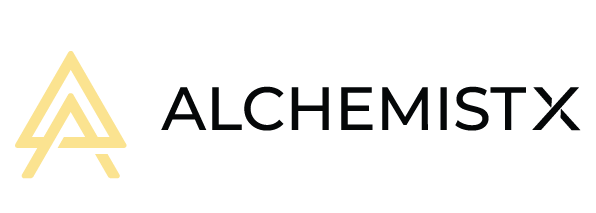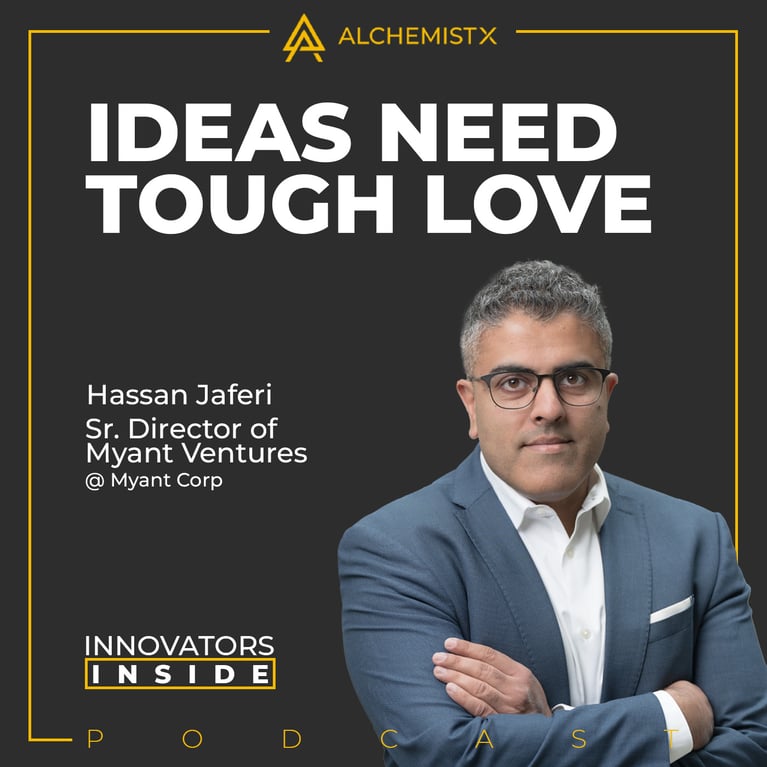Discover how Maura O’Neill, founder of The Decade Project and former Chief Innovation Officer at USAID, is redefining entrepreneurship to reflect America’s true diversity. Explore her framework for inclusive innovation, access to capital, and bold change.

AlchemistX: Innovators Inside
E.12 - Shige Ihara: Win-Win Situation
Published on
June 10, 2021
"Once we can identify the pain point for certain customers and we identify the large unmet needs in the market, then we believe there is high potential or high possibilities of business success." - Shige Ihara
Show Notes
Rachel Chalmers:
Today, I am honored to welcome Shigeto Ihara to the show. Shige is the president and CEO of NEC X launched in 2018 by NEC Corp, formerly Nippon Electric Company. NEC X is a Palo Alto based business incubator that fast-tracks technologies and business ideas selected from inside and outside NEC. In October of 2020 NEC X graduated its first start up inguo.io, a causal analytics company.
Full disclosure, Alchemist is working closely with NEC X on its current accelerator batch. Before joining NEC X, Shige was general manager of the research planning division of NEC.
Shige, thank you so much for joining us today.
Shige Ihara:
Rachel, thank you for introducing me, and thank you for having me today.
Rachel Chalmers:
It's great to have you here.
Can you tell us the story of how NEC X came into existence?
Shige Ihara:
NEC has a very long history as a Japanese electronics company. It's more than a hundred years old. Then NEC used to have various businesses including home electronics, semiconductor, and also the computer or network businesses. Then due to some environment changes, NEC has exited many businesses and is focusing on the solution oriented business. Some semiconductor or personal computer or some hardware business, NEC exited these to focus on the solution.
Rachel Chalmers:
Where the margins are so much higher.
Shige Ihara:
Yeah, that's right.
But NEC also keeps Corporate laboratories. NEC has global R&D operations around the world and then we develop many interesting technologies. Then these technologies, especially AI machine learning or some computer platforms or networking technology - these can be applicable not only for solution oriented business, but also for the other domain outside of an NEC’s existing portfolio. NEC is now focusing on B2B or B2G type of solutions.
But as you can see, these technologies can be applicable for some B2C or other domains. Then from the viewpoint of some kind of technological asset management, NEC’s top management wants to leverage NEC’s R&D capability of having such advanced technology. Not only applying it to the existing business, but also trying to find out some other business opportunities outside in its existing area. So that is the kind of intention. And then NEC X has been established to create new business based on the advanced technology in Silicon Valley.
Rachel Chalmers:
I think my favorite thing about your program is that you have all of these fantastic pieces of technology from within NEC's research division. You match those with external entrepreneurs. You put out a call and say, “How might we commercialize these pieces?” Startup folks from the valley come to work closely with the Japanese research teams and come up with these great businesses.
Shige Ihara:
Yeah, that's kind of what we are doing.
I believe NEC has very good technology - advanced technology. But technology alone is not enough to create a new business. As you mentioned, some kind of combination of technology along with entrepreneurs or some kind of business expert is very key to be successful in creating a new business based on the technology. That's why NEC X is established in Silicon Valley. Because Silicon Valley is the one of the best places in the world to do such kinds of activities.
Rachel Chalmers:
Well, I certainly agree on that point.
The cool thing about it from my point of view is that the incentives are so well aligned that entrepreneurs get a bit of equity, NEC gets a bit of equity and everybody's working together. I think one of the failure modes of Corporate Innovation is that you are expecting employees to take on the work of entrepreneurs and to take on the risk and the ambition. That's hard for an employee to do because the incentives aren't there.
Shige Ihara:
That's one of the challenges for us. If NEC has enough capability or some knowledge of the business development - including the domain knowledge. Maybe NEC is not necessary to have this NEC X type of activities. But as you mentioned, in order to create a new business outside of NEC’s scope, we need to collaborate with the other players including entrepreneurs and investors. We need to share the risk, along with sharing the return. That’s the very key mechanism for us to learn in Innovation.
Rachel Chalmers:
Exactly and in the ideal case, you get this win-win scenario, where the entrepreneur gets this depth of technology as a head start and NEC gets this expertise around how to enter new markets, where it doesn't have that domain expertise.
Let's look at a specific example - what was the tech seed for Inguo?
Shige Ihara:
The software has been developed under NEC laboratories of some causal analysis AI tools. Then we believe this has a value in the market and that is the reason we started this project.
Rachel Chalmers:
There's a really nice case study on the company's site talking about the application in consumer packaged goods. There's a stain remover and the causal analytics help figure out what caused the stain and diagnose what kind of stain removal approach would be best. It's a very clever application of the technology and obviously one that is so far outside NEC’s traditional business that you needed somebody to come in from outside.
Shige Ihara:
Yeah, in Inguo’s case we hired an EIR. His name is David. He is very experienced with the market research industry. We believe that the market research industry might be a good beachhead to create a new business of causal analysis technology. So, David brought us market intelligence - how to communicate with the customers, how to explain the value of the technology to the market. He has very good experience. Combined together with his expertise and NEC’s technology, I think it’ll prove to be a very good fit.
Rachel Chalmers:
A really good cross-pollination.
Shige, when you look back on your own work in Innovation, what are you proudest of?
Shige Ihara:
NEC’s technology has a kind of world class performance, including some academics. We are struggling to create new business because we don't have enough knowledge to create a business. So through this journey, once we have good matching with the domain expert, I am confident that NEC technology has value if we identify that good match.
Rachel Chalmers:
NEC is far from being alone in struggling to build new companies. We work with partners all over the world in the same situation. You know you mentioned earlier that Silicon Valley is a great place to do this. There's so much knowledge about company building here and it feels like a really fruitful collaboration for an established company to have an outpost here and to be able to tap into that company development knowledge base.
Shige Ihara:
Another one of our key success factors for us is to have a good connection or some good network to work together in the Silicon Valley environment. Especially some talented people in Silicon Valley. I think it's very important to find some good talent who can work with us. That is one of the key success factors. So that's why I'm happy to work together with Alchemist.
Rachel Chalmers:
We're very happy to work with you too. It is all about the network. One of the great things about working at Alchemist is that Ravi, our founder, has built an incredible network over the years. So we can tap into that for mentors and for entrepreneurs in residence and it makes me feel good about supporting your program.
If you had one do-over, if you got to do something over again, what would you do differently?
Shige Ihara:
In order to have some good collaboration with some ecosystems in Silicon Valley, I found that it's very important to have some clear distinction between what NEC X can offer. Including some kind of equity share policy or some technology license mechanism. Through the past experience we have developed what is the best balance point. Sort of the win-win situation as you mentioned in the participant. Now I think NEC X has some sort of better understanding of what kind of balance point is in the market. I like to start sharing this type of idea first with the entrepreneurs or investors at the very beginning.
Rachel Chalmers:
I think that's a great idea because it is really hard to get these incentive structures right. It's a constant negotiation.
What is the value NEC is bringing to the table? What is the value the entrepreneur is bringing to the table? What's a fair distribution of the ownership around that.
Shige Ihara:
We have not reached the completed stage yet. I mean we are still developing or evolving ourselves. But if I could get back to the original stage, it's better for us to start with this type of template at the beginning.
Rachel Chalmers:
Yeah, good lesson learned.
What is it that makes corporate Innovation so difficult?
Shige Ihara:
It depends on the industry. But especially for the technology industry. Some macro trends or technology itself, will become commoditized. Technology alone will not be some differentiator. Then some sort of combination of how to use it, or how to realize such a technology from the viewpoint of the application. Or from the viewpoint of the user.
That kind of knowledge is very important for business Innovation. Then some corporations have a lot of resources but I think it's not enough to get such knowledge, just only focusing on the internal resources. Technology itself has become commoditized and we cannot stop it. So the question becomes, how to get this knowledge or how to get outside intelligence? Both are important.
Then it contradicts with the Corporate momentum in many cases. Figuring out how to break through that momentum is the hard part of the large Corporation.
Rachel Chalmers:
Yeah, that's a deep point. As good as the technology is, it's replicable. Somebody else can build that functionality. The hard part is often creating that customer experience and having that deep knowledge of the customer and that's hard in a corporate context. Because you're so specialized and siloed. There are researchers and then there are sales folks, and they don't typically talk to each other. Incorporating that experience into a product becomes exponentially harder.
Shige Ihara:
Many Corporations (not only NEC), have the experience to be successful in the existing business. Corporations tend to maximize the benefit or revenue from the business. Which is good. But it's hard to create a new business alone by the company or enterprise itself.
They just need to have some open Innovation environment or some system needs to be introduced. That is the kind of hard part for the enterprise - to tune themselves to the ecosystem.
Rachel Chalmers:
So then it's back to Silicon Valley and back to the network.
Shige Ihara:
Hmm. Yeah, that's right.
Rachel Chalmers:
How do you think the COVID pandemic might affect Corporations in the longer term?
Shige Ihara:
I'm a strong believer that the pandemic effects have both positive and negative parts. As you can see, the economy in general slowed down because of the pandemic. At the same time, there are lots of new Innovations and opportunities for the new technology or Innovations to be applied.
Rachel Chalmers:
The economy didn't slow down as much as we expected it to. I like the way that the pandemic has rewritten some cultural norms. For example, working remotely is much more recognized and accepted than it was before.
Shige Ihara:
It seems to me that this very large scale, new social experience will be emerging. Which is going to change the work style of the people. Not only their workstyle but their lifestyle as well. Which in turn, stimulates some new services or new products into the market. It’s a very tough situation. But once we can overcome this pandemic, we can see much more interesting market opportunities in the future.
Rachel Chalmers:
How would you distill all of your experiences into one or two lessons for our listeners?
Shige Ihara:
From the viewpoint of business creation or business development, it's very important to understand the customers. What is the customer’s pain or what is the requirement from the Market? It's very simple but very important to understand. Once we can identify the pain point for certain customers and we identify the large unmet needs in the market, then we believe there is high potential or high possibilities of business success.
So understanding the customer's needs is very important. That's what I’ve learned from my journey.
Rachel Chalmers:
One of the things I really enjoy about the programs we run is getting folks who have never done customer discovery before and training them and telling them, “I promise you, after 20 interviews, you'll change your mind about what the segment is, about what the problem is.” It never fails between 20 and 25 interviews, they have that moment where the penny drops and they start to understand the power of this approach.
It's so rewarding to me to push people outside the building. Virtually right now but eventually physically again - just get them talking to their customers.
Shige Ihara:
It's interesting to see. At the beginning of the program, many members tried to sell their idea to the customers. Along the program, they understood that they needed to listen. And they needed to not only just listen, but to understand what the real point was from the viewpoint of the customer needs. That’s the art of this incubation activity.
Once we break through that, then the project’s success rate will go up.
Rachel Chalmers:
Building that customer empathy muscle - the entrepreneurs who spend the longest doing that - that activity is highly correlated with the success of a project.
Shige, how do you avoid burnout?
Shige Ihara:
In this remote environment, I tend to do some exercise. I’ll either walk around or take some time to jog. It helps that Silicon Valley, California is a nice place for outside exercise. I try to have as much time as possible for exercise.
Rachel Chalmers:
Yeah. I wonder if that's why we've ended up building Silicon Valley in a place with such nice weather. Because instead of becoming a brain in a jar, you can always just go out for a walk in the woods.
Shige Ihara:
Due to this environment, I like to think I am in good shape.
Rachel Chalmers:
What is the best way for our listeners to connect with you or follow your work?
Shige Ihara:
NEC X has a website and on it we post about our upcoming events and activities. If somebody is interested in our program, I recommend that they check out the NEC X website.
Rachel Chalmers:
Yep. It's a great resource. And as I say this, this program is very close to my heart. So check it out.
Shige Ihara:
Yeah.
Rachel Chalmers:
What does the future look like for you personally?
Shige Ihara:
Personally, I love this mission. Of course, it’s very exciting. But from the viewpoint of NEC Corporate, I don't know how to say it, but I would like to share my experiences in Silicon Valley with my colleagues in Japan.
Rachel Chalmers:
Yeah, that's the hard part of Corporate Innovation. It’s taking the lessons learned back to the Mothership and being able to transfer that.
For a bonus round, can you recommend any books or TV shows that you're enjoying?
Shige Ihara:
I like the book, Innovator’s Dilemma.
Rachel Chalmers:
Yes. Yeah. That's a great one.
Shige Ihara:
Yeah. I think that it is a very interesting analysis about the industry.
Rachel Chalmers:
Shige. It's been an absolute delight to have you on the show. Thank you so much for taking the time.
Shige Ihara:
Thank you, Rachel. I enjoyed that a lot.
Rachel Chalmers:
Take care.
Shige Ihara:
Thank you, take care.
References
NEC X - a Palo Alto based business incubator that fast-tracks technologies and business ideas selected from inside and outside NEC
NEC Corp - The Mothership of NEC X and formally known as Nippon Electric Company
Inguo.io - A causal analytics company that graduated from NEC X
Innovator’s Dilemma - a book Shige recommends
Intro and Outro music composed by: www.PatrickSimpsonmusic.com
Recent Episodes

How to Build, Scale, and Safely Deploy AI in Business
In this episode, Ron Green draws on over 30 years of hands-on experience in artificial intelligence to reveal how companies can unlock its full potential.

.svg.png)









